A transition in the papacy is a momentous, historic event in the life of the Church—and in the life of Catholic Extension Society.
That’s because we are a papal society (also known as a pontifical institution).
What does that mean, and why does that matter?
What is a papal society?
A papal society is a Catholic organization whose canonical existence relies on the Holy See, not any given diocese. It operates under the authority of the pope and works to advance the mission of the Catholic Church according to papal-approved charter and by-laws.
Why was Catholic Extension Society established as a papal society?
The pope at the time of our founding was Pius X, pictured here on the cover of Extension magazine.
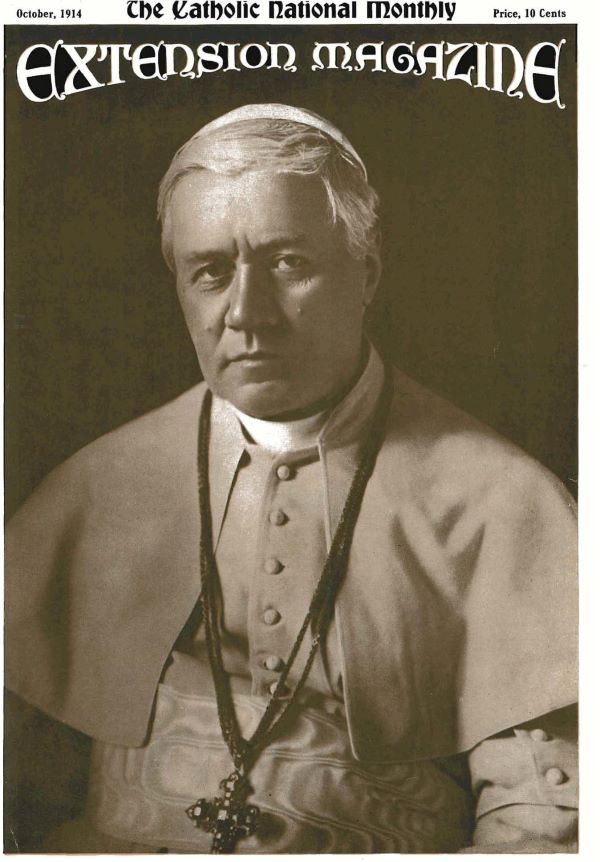
He took a special interest in the ambitious work of our visionary young founder, Father Francis Clement Kelley.
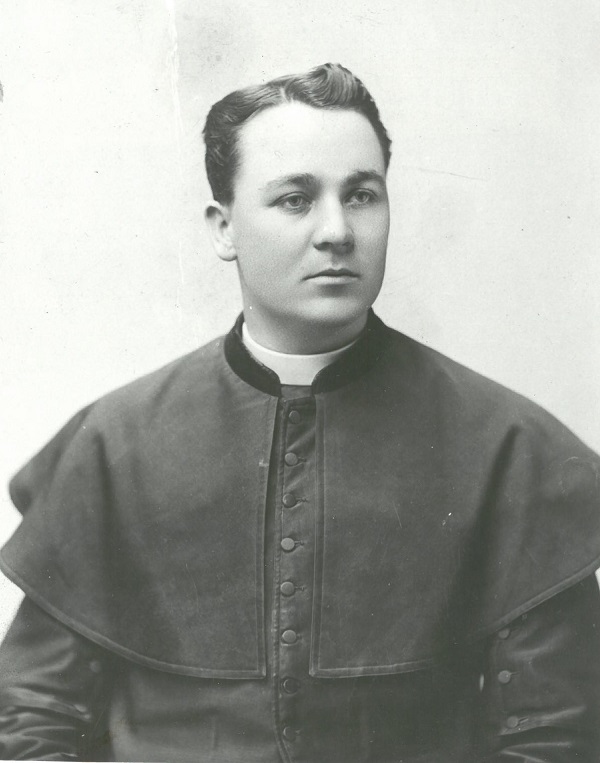
Father Kelley founded Catholic Extension Society because, as he traveled the country, he found many areas where there were Catholics, but no presence of the Church. He knew that building up faith communities in the hills and hollers, the frontiers and borderlands of our country, would strengthen the Church and change the fabric of this nation.
Catholic Extension Society began to build little mission churches in isolated new settlements all over the country: in Texas, Alaska, the Deep South, the Midwest, Puerto Rico and more.
Father Kelley also built “chapel cars,” which were train cars converted into mobile churches that traveled to isolated communities, offering Mass to Catholics who had no local church and no local priest. One these chapel cars named, “St. Paul,” is pictured below with a community in Cheneyville, Louisiana.
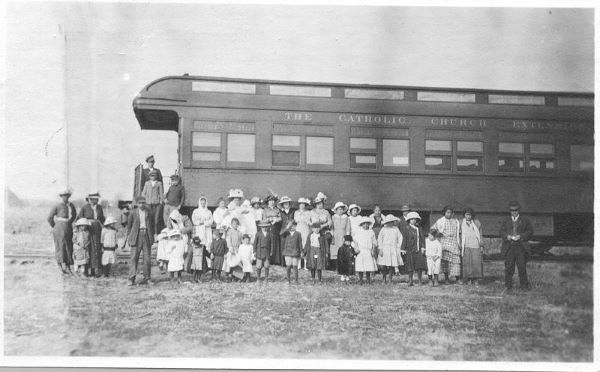
Likewise, Catholic Extension Society began supporting the Church in areas where there had historically been a robust Catholic presence, like in Puerto Rico, but had recently become U.S. territories.
There were aggressive campaigns at the highest levels of the U.S. government to de-Catholicize these peoples in an attempt to “Americanize” them. Catholic Extension Society stepped in to ensure that the Catholic Church could continue to thrive in these new U.S. territories.
Pope Pius X was impressed by the work, and moved quickly in 1910 to ensure the organization was officially authorized and protected by the Holy See.
“Through the pope’s own direct and personal action, this Society was canonically established,” Father Kelley wrote. “When the formal approval of our work seemed about to be postponed for a long time, it was Pius X himself who took the case out of the slow grind of the ordinary machinery, personally examined the documents relative to it, and, by his own proper authority, gave the Society canonical existence, placing it among the approved institutions of the Holy Church.”
He continued,
Never was a report issued by the Society that was not seen and examined by the pope himself. He was especially interested in the Chapel Cars. He had photographs of all the cars in his possession.”
What does it mean today to be a papal society?
Notice how we received direct assistance and encouragement from Pope Pius X to forge ahead in our mission. That pattern continues to this day. Pope Francis swept in a new era of mercy and dialogue that touched the hearts of billions around the globe—believers and non-believers alike.
Not only did he speak our language of mission about “going out the peripheries,” Pope Francis continued to directly intervene to support our mission. This was the case in 2017, when he sent our chancellor, Cardinal Cupich, to Hurricane-devastated Puerto Rico.
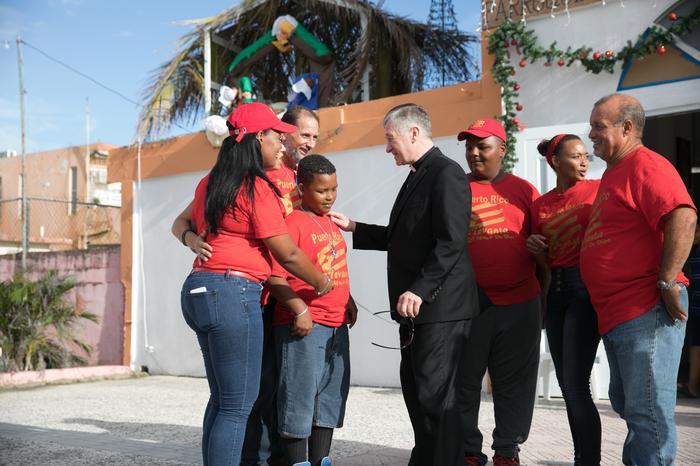
Catholic Extension Society then began a massive recovery effort to rebuild 600 damaged churches and schools—an effort the Holy Father continually expressed gratitude for.
Apart from these extraordinary interventions, here are some other ways that Catholic Extension Society remains strongly connected to the Holy See, and how it affects our mission:
Our president is appointed by the pope
Since we were founded as a papal society, the president of Catholic Extension Society has always been, and will continue to be, directly appointed by the Holy See. Our current president, Father Jack Wall, is pictured below.
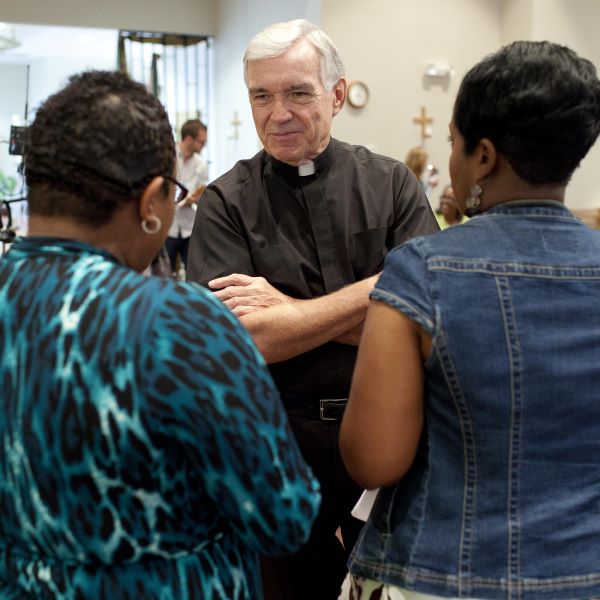
They serve five-year terms, which can be renewed. In our history, Catholic Extension Society has had 10 different presidents who served under the same number of popes.
We are bridge-builders
The Latin root for the word “Pontifical” is Pontus, meaning “bridge.”
As a papal society charged working in solidarity with people to build up vibrant and transformative Catholic faith communities among the poor in the poorest communities of America, we have a duty to serve as a bridge-building agent for the Catholic Church in the United States.
One of the very basic ways that we build bridges is through financial support. Currently, we fund 87 U.S. dioceses, reaching 15 million Catholics.
We build a bridge to these communities that do not have the means to support themselves—such as Our Lady of the Snows Parish in Nulato, Alaska.
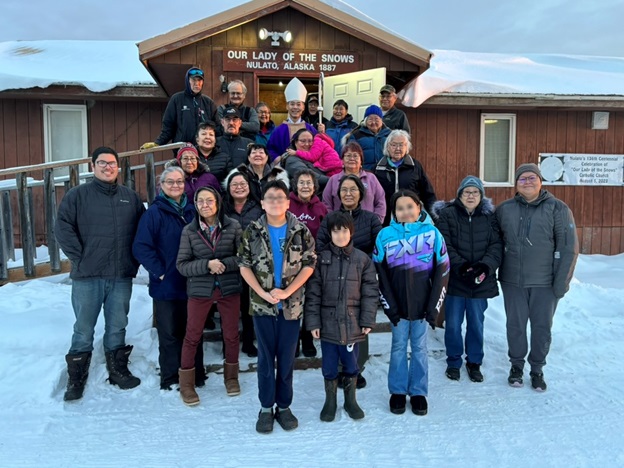
As Catholics, we are not part of a member-centered club. Rather, we are a mission-centered reality. Being Catholic requires us to be bridged into something greater than just our own parish or school, and to see beyond the limits of our deanery or even our diocese.
The Church, because it is universal and not congregational, calls us into a reality, a community, and a mission that is beyond our immediate parish or diocese. Catholic Extension Society serves as a bridge for Catholics to participate in that larger reality.
We are adaptable
Although a term like “papal society” might sound old-fashioned, Catholic Extension Society is as “cutting edge” today as it was 120 years ago.
In fact, it was Pius X himself who recognized our potential for change and growth in the future.
In 1910 Father Kelley traveled to Rome to ask Pope Pius X to make Catholic Extension Society a papal society. He arrived with a drafted constitution that would create rules and laws that the organization must abide by.
This excerpt from the biography “Francis Clement Kelley: The American Catholic Dream” describes how the pope intentionally established us a papal society with flexibility:
“In his audience with Pius X on May 1, 1910, [Father Kelley] found the pontiff briefed well on Extension. The pontiff questioned the detailed character of Kelley’s constitution, explaining that its many provisions would only harness a young organization. Extension, he advised, was too inexperienced to impose upon itself a heavy structure which would discourage adaptation in the years ahead. Instead of approving the constitution, Pius issued an apostolic brief, Qua Nuper, which elevated Extension to a pontifical institute.
“… With its new status as a pontifical institute, it had special proof of Rome’s approval of its work. The simplicity of the Qua Nuper testified to the confidence of the Holy See in its capacity to work out its own future.”
This spirit of adaptation to the times continues to define our work.
When the automobile was invented, we purchased them for priests to help them serve vast parish territories, as depicted in these images from a 1922 issue of Extension magazine:
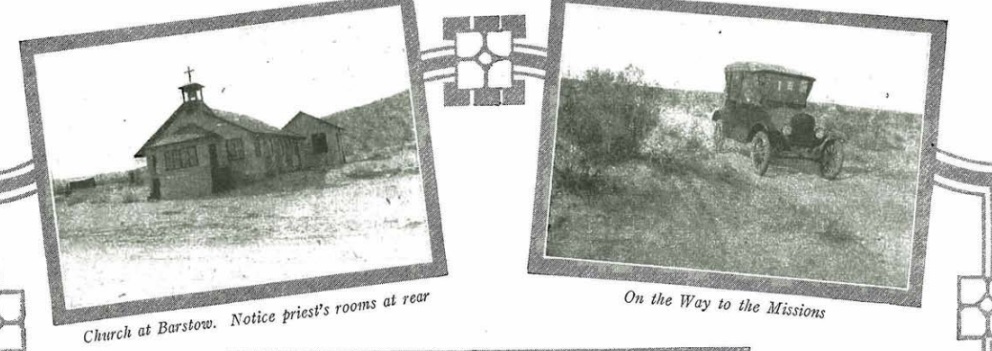
In the 60s, we created an Extension Lay Volunteer program that enabled thousands of young Catholic volunteers to minister in poor communities.
In recent years, we have established many new strategic initiatives to educate and form local lay leaders; establish prison and addiction ministries; train Catholic school principals; help families pass on the faith to their children, and so much more.
Ready for the future
When Father Francis Kelley left Catholic Extension Society, he reflected on all that was accomplished in his nearly 20 years as president of the organization.
He wrote:
The best thing about the Society—and this we owe to our wise and prudent counsellors—is adaptability. It can step into any breach. It has had no inconvenient tradition fastened on to it by the centuries. It has taken to heart the idea, first broached by Pius X, that it is a new society in a new country, and should, therefore, be prepared to take anything good in hand.”
No matter who emerges from the balcony following the conclave, we look forward to learning from, working with, and supporting the vision of our new pope.
Catholic Extension Society works in solidarity with people to build up vibrant and transformative Catholic faith communities among the poor in the poorest regions of America. Support our mission here.
Header image created with assistance from Midjourney.


